#streaming is what literally led to the publics support for broadcast television to go down hill
Explore tagged Tumblr posts
Text
Ted Sarandos tries so hard to be like-able and relatable more than any other studio executive I've ever seen.
Like, look at this dude?


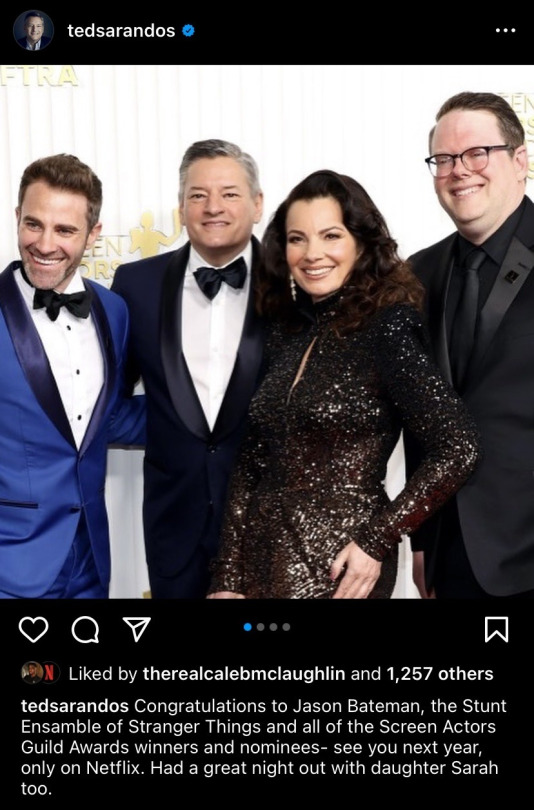
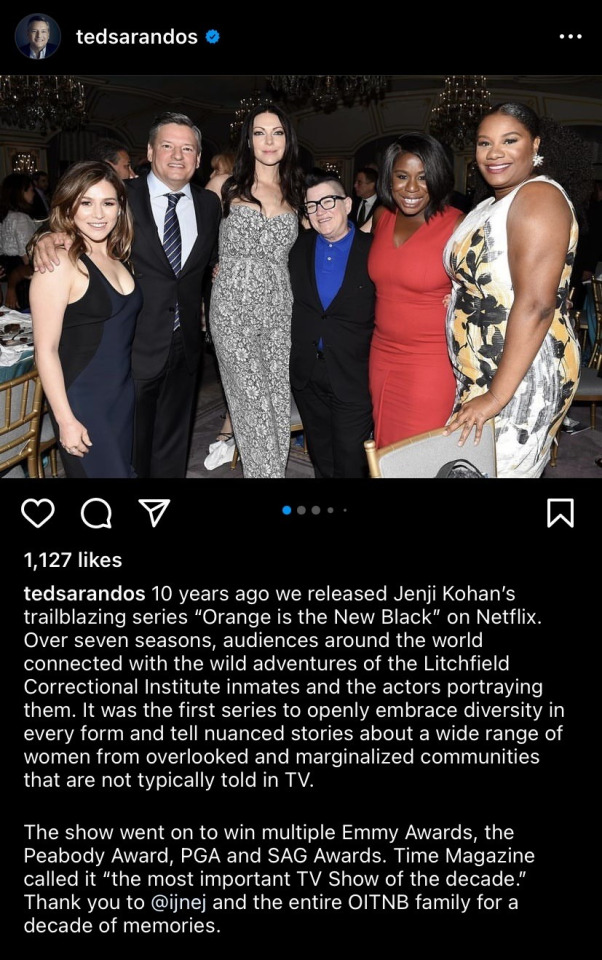
Don't you just want to punch him in the face?
And it gets worse...
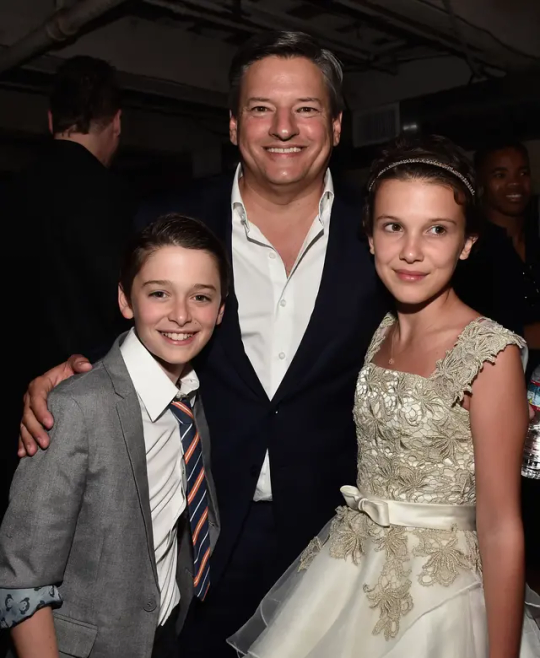

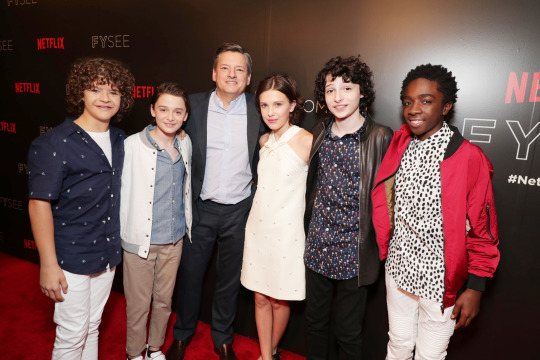

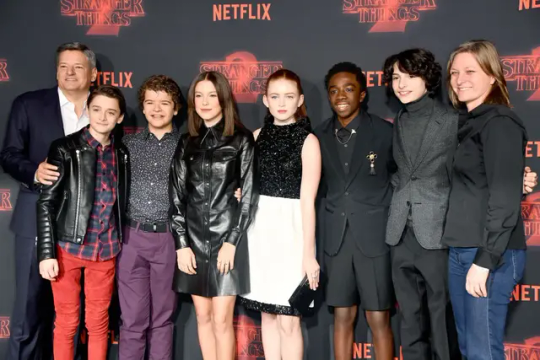
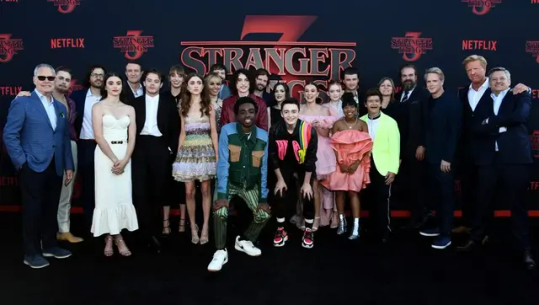




He might look friendly and charismatic amongst these familiar faces, but at the end of the day, Ted is just another studio executive who is willing to cut costs wherever he can, in what he sees as loose ends capable of saving Netflix millions, but actually does in fact result in devastating repercussions for real people.
And yet still, I question his plan for all of this, as Ted is behind the company that has changed the way entertainment is consumed in the first place, with their company flourishing as a direct result of the 07-08 writer's strike. At first it was slow, but then it was full speed ahead, with Netflix starting a trend of streaming that upended the entire entertainment industry, essentially forcing everyone to follow suit. This has then brought us to a point where the conditions and compensation for workers do not at all match what is expected of them, because it is all based on an expired business model that no longer applies.
And yet, Ted has chosen the route as a CEO to create this friendly mask of familiarity amongst his talent and in the business as a whole, in a way that makes you want to trust him.
When new productions are coming out, he's in attendance making small talk and gushing in interviews about how important it is to tell all these stories, making it clear he's trying to convey that morality and this idea of doing the right thing, is important to him presumably.
But how can he call himself 'a union man', from 'a union family' and push this moral agenda, if he's going to continue to play one of the biggest roles in this strike, with the ability to solve it swiftly by just meeting the guilds demands, all the while tearing down that moral image entirely in the process by refusing to do so?
Because the thing is, this image of morality is him using human emotions that he knows make people fall in love with movies and TV in the first place. He knows that a lot of the support comes from people who give a fuck about human lives and people being treated fairly, especially now in 2023.
So, why in the hell would he expect the people he is presenting this morality to, as a cornerstone of their mission (manipulation tactic to distract from the true goal: exponential growth of profits...), to just sit by and be okay with the writers and actors and anyone and everyone on these movies/shows sets, to feel like they are being taken advantage of and abused because of his working conditions???
In the scenario Ted wins and the writers lose, Ted STILL loses, because this facade is now overshadowed by resentful workforce and an audience that is going to have a hard time getting behind trusting this company long term, eventually leading to their downfall.
You think people want to watch a show where we know the working conditions were awful, with them being on the cusp of changing that, only to be fucked over and have to go right back to those conditions?
The strike is a double edged sword at this point, but there's no denying these executives (esp charismatic Ted) would be much better off taking the -0.3 annual costs and calling it a day.
I guess it doesn't really matter though, because to Ted and all these other executives, the bottom line for investors will always be short term growth. They care about right now, not the future. If they can keep up the act that everything is going swell and convince their investors (and competitors) that profits went up this quarter and are projected to continue going up in the next one, they're doing their job. Even if that means burning to a crisp later on, so be it. It'll most likely be someone else's problem by then anyways...
Regardless, I look forward to seeing Ted succumbing to his inevitable fate of meeting the guilds demands, all while he himself has spent years building up and fostering this friendly image, encouraging this idea that morality is important to the end goal. Who would have thought Ted?? That your facade would contribute to backfiring in a strike for workers rights, supported heavily by the very public your company has spent the last decade providing content to, that supports that very same message?
#byler#netflix#stranger things#ted sarandos#jo rambles#oh and bob iger!... have you ever heard of a bugs life? or newsies??#congrats. you played yourself#btw i could not find that picture of noah with ted and nina dobrev on his instagram...#though he posted it in april of this year...#i guess he deleted it...#see Ted!?#your talent is turning on you#talent photo ops REVOKED from ted until further notice#in all seriousness#what really grosses me out is the very high likelihood this strike doesn't affect netflix at all the way it does major broadcasters#broadcasters are holding on for dear life all while Netflix and the other giants like Disney and Warner Bros. are totally fine for now#streamers benefit from a 6 month strike in contrast to broadcasters that are running on borrowed time#streaming is what literally led to the publics support for broadcast television to go down hill#you know... the system that allowed people to get residuals#so yeah i think they're ok with holding out until October#and leading up closer to that is when we're actually going to see the studios start making realistic negotiations#live tv has a very high likelihood of being dead after this is all said and done...#2007 all over again#but for real this time.#and then watch!#netflix is gonna try to revert back to a live tv system with ads#going back to a system they tore down#but have no intention of playing by that systems rules to ensure their workforce is protected in ways they've fought for decades before#fucking despicable#everyone has to suffer because these guys benefit from holding out a 6 month strike if it means coming out on top once and for all
12 notes
·
View notes
Text
Doris Kearns Goodwin’s 10 Leadership Lessons from the White House
Inviting Doris Kearns Goodwin to speak to a gathering of thousands of educators brought together by the annual ASCD Empower19 conference might have seemed like a surprising choice at first. Over the past four decades, Goodwin has earned her moniker, “Historian of the presidents.” She’s written a half-dozen best-selling books, including ones on Presidents Abraham Lincoln, Theodore Roosevelt, Franklin D. Roosevelt and Lyndon B. Johnson.
But when ASCD board member Ben Shuldiner introduced Goodwin, he underscored that choosing her was no happy accident. Goodwin studies presidents as leaders, and today, those are needed more than ever in education. “Decisions are being made by people who haven’t been inside of the classroom,” he told the assembly—and those decisions are frequently “not being made in the best interests of our children and our teachers.
“Your voice needs to be heard. In the classroom, but also in the capitol,” he urged.
With that introduction, Goodwin explained how after many decades in what she called an “odd profession—spending time with dead presidents,” she decided to see what traits they had developed in common. Her 2018 book, “Leadership in Turbulent Times,” has “no master key for leadership,” she said. But it does identify a collection of strengths, habits and behaviors that presidents cultivated to become authentic leaders during some of America’s toughest periods—including the Civil War, which literally tore the country apart, to the Depression and through the turmoil of Vietnam.
With public sentiment, nothing can fail. Without it, nothing can succeed.”
Abraham Lincoln
“They all made themselves leaders through their work ethic,” she said.
Here are 10 lessons Goodwin has gleaned from studying the minds and habits of each of the four presidents—as well as some of the choice examples she shared from their lives:
Doris Kearns Goodwin (Source: ASCD)
Leaders Grow, Through Adversity, Humility and Empathy
Lincoln’s family thought he was lazy because he wanted to read books instead of do physical work. As a politician, he lost more races than he won. (The presidency was the exception, she noted wryly.)
Roosevelt had so much self confidence, Goodwin said, quoting one contemporary, that “he wanted to be the baby at the baptism, the bride in the wedding and the corpse at the funeral.” But when he realized he lacked allies and couldn’t get legislation through Congress, he “moderated his language and became a bipartisan leader,” she recounted. FDR learned humility when he fell victim to polio which paralyzed the lower half of his body. Other polio patients who joined Roosevelt at the mineral springs spa in Warm Springs, Ga., said: “He changed our feelings about ourselves.”
Leaders Have the Self-Confidence to Surround Themselves With Strong-Minded People
LBJ, never one to mince words, said it was “better to have your enemies inside the tent pissing out than outside the tent, pissing in.” Eleanor Roosevelt was a strong leader and frequently held different views than her husband; even so, she was “a welcome thorn” in FDR’s side and so helped advance equality for women by continuing to press their case—including holding regular press conferences in which only women reporters could attend, prompting newspapers to hire their first-ever female reporters.
Leaders Can Inspire and Motivate Others, Creating a Culture of Respect
Lincoln was generous in crediting others with success; his papers are filled with notes complimenting others. FDR’s capacity to inspire and encourage his staff and those around him made it possible for them to carry on when the challenges of the Depression weighed heavily on them. “He didn’t solve their problems,” but cheered up the team so they could continue to forge ahead, Goodwin said.
Leaders Are Ready to Take Full Responsibility and Shoulder the Blame for Their Decisions, Especially When Things Go Wrong
After listening to his advisors argue about whether and when to emancipate the slaves, Lincoln finally announced: “My mind is made up. There will be no more debate.…” He was ready to accept responsibility. But because he had listened deeply enough, no advisor publically disagreed once the decision was made.
Leaders Can Transcend Past Slights and Resentments
As a young lawyer, Lincoln was thrilled to have the chance to work with the famous Edwin Stanton on an important case. Before the case was tried, however, the brief was transferred away from Lincoln without his knowledge. He continued to trail after Stanton, even stopping him on a street corner to discuss the case. Stanton turned to an associate and remarked: “We have to lose this long-armed ape because he will lose the case.” Years later, when President Lincoln needed a Secretary of War, advisors strongly advised Lincoln to hire Stanton. He did. In the end, Stanton said he’d come to love Lincoln more than anyone in his own family.
Leaders Are Approachable and Accessible, and Establish Direct Connections With the People Around Them
In the days before the civil service was established, Lincoln held hours-long daily meetings where anyone could ask him for a job. On the day when he was slated to sign the Emancipation Proclamation, he had shaken the hands of more than 1,000 people—so many that his own arm was shaking and unable to sign the document. (He waited until his signature would look strong and bold for all future generations.)
Teddy Roosevelt spent more time on the road than any other president—six weeks in the spring and in the autumn. LBJ invited every Congressman and his wife to dine at the White House in groups of about 30. He then “never stopped calling them,” to coax support for his plans.
Leaders Communicate Simply and Directly Through Stories—and Through the Media of Their Time
Lincoln could tell entertain an audience with a story—with enough detail and richness that everyone would remember (People remember stories more than they remember facts or figures, he said).
Teddy Roosevelt had the knack of coining soundbites and slogans, such as a “square deal for the rich and the poor.” (He even gave Maxwell-House coffee—“Good to the last drop!”—its slogan.) FDR “had the ideal voice for the radio age,” Goodwin noted, and people listened. Writer Saul Bellow once observed that he could stroll down a street in Chicago during one of the weekly broadcasts and not miss a word as FDR’s words poured out of every window.
JFK and Reagan mastered television, Goodwin observed. And Trump, more than any other candidate, dominated Twitter. “But as so many people have learned,” she observed, “spontaneous words can have unintended consequences.” Although Lincoln was a master of debate and speaking extemporaneously, “he knew his words mattered,” she said. Once elected, Lincoln only spoke from prepared scripts.
Leaders Find Ways to Control Negative and Unproductive Emotions
Lincoln would vent rage in a letter—that he would neither sign nor send, including a scathing missive to Civil War General George Meade, which Lincoln shelved because it might damage morale. Roosevelt went through four or five drafts of his weekly fireside chat: The first version would rage at his foes; all the bile was washed out by the last version turning it into “sweetness and light.”
Leaders Take the Time to Think, Relax and Replenish Their Energy
Lincoln went to the theater 100 times during the Civil War. Teddy Roosevelt exercised two hours a day, including taking vigorous hikes through the then wilds of Rock Creek Park. (He even led the ambassador from France wading through a stream naked except for a pair of lavender-colored gloves that the ambassador insisted on wearing for etiquette.) And FDR hosted a cocktail party, which forbid discussion of the war every night, packed with friends who were long-term guests at the White House.
Leaders Transform an Ambition for Self Into Ambition for a Greater Good for All
All the presidents were driven by different ambitions and, in part, by how history would judge them. But they channeled those personal ambition into something bigger. Although LBJ’s advisors whispered that his social campaigns would destroy him, he ignored them with a terse: “What the hell is the Presidency for?” People around the world knew of Lincoln not as a great general but for “his moral fiber and integrity.”
The role of historians is to remind us of how we navigated the past. But even though she has spent her life studying the presidents, Goodwin emphasized that it’s a country’s citizens who matter deeply—and its teachers who will mold the sentiment of each new generation.
“Every important change has begun with citizens,” Goodwin advised. She cited Lincoln, who praised the soldiers, not himself, for emancipation: “With public sentiment, nothing can fail. Without it, nothing can succeed.”
Doris Kearns Goodwin’s 10 Leadership Lessons from the White House published first on https://medium.com/@GetNewDLBusiness
0 notes